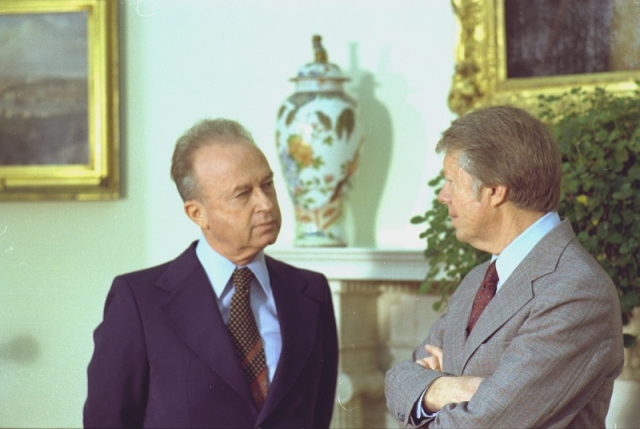On March, 7th, 1977, Israeli Prime Minister Yitzhak Rabin visited the White House to speak with President Carter about security issues, along with future peace agreements. When Rabin came to Washington, the Carter administration began the process of establishing a foreign policy priority for its administration that would be led by negotiating a comprehensive resolution of the Arab-Israeli conflict.
The Carter administration, against Israel and Rabin’s wishes, felt they needed to include the PLO in future negotiations; it also seeks to include Judea and Samaria as the location for a future Palestinian state. Israel was not prepared to either negotiate with the PLO or negotiate about Jerusalem, just 10 years after Jerusalem was unified by the IDF and as the PLO was actively attacking Israeli citizens.
#OnThisDay in 1977: Israeli Prime Minister Yitzhak Rabin met with President Jimmy Carter at the White House (A couple months later; Menachem Begin was PM And by the end of the year; Anwar Sadat visited Jerusalem) https://t.co/lrUMggsLFb @CarterLibrary @CarterCenter #Israel
— Washington Views (@WashingtonViews) March 7, 2023
Rabin arrived in Washington while bringing a peace treaty draft that was meant for Israel and Egypt, and Jordan. Carter asked Rabin what the steps needed are, along with an interim agreement. Rabin said, according to White House records, “no interim step, the next step is a peace treaty.” Carter thought that Rabin was a bit of a deadbeat and unresponsive to Carter’s questions about the Israeli desire to deal with the PLO.
Carter took the view that the US should be the main negotiator and mediator in all future peace agreements between Israel and Palestinian organizations. Carter was considered impatient with the situation, while under the impression that Israeli leaders were too cautious. Before Rabin left Washington, Carter made a public statement calling for the PLO to engage in negotiations.
March 07, 1977 Israeli PM Yitzhak Rabin meets US President Jimmy Carter #Today #OnThisDate #People #History #Event #Now #PR pic.twitter.com/DOb0pnqfLi
— Amir Alhaj | ASM | International PR Consultant ℠ (@AmirAlhaj_ph) March 7, 2022
Shortly after the visit, Rabin was forced to resign due to an internal fiscal scandal. In the upcoming May 1977 Israeli elections when the Labor Party famously lost to Menachem Begin’s Likud Party, Begin’s advisers examined the transcripts of the Rabin-Carter exchanges and were hesitant about the entire discourse, which suggested the terrorist organization would gain power over the West Bank and East Jerusalem.
"The United States and the USSR appeal to all parties in the conflict ..."
— Center for Israel Education (@israeleddotorg) March 6, 2023
Jimmy Carter wanted to work with the Soviets on a comprehensive Mideast peace, as shown by CIE's Carter Doc of the Day, issued Oct. 1, 1977, without consulting Israel or Egypt.https://t.co/ix3qjJI0eh pic.twitter.com/9o8Z9bbmWN
Begin and Carter would have their own extreme disagreements about the Israeli settlements being built in Judea and Samaria, something at the time considered acceptable by Rabin and much of the Israeli left as well. However, the origins of tension in US-Israeli ties in regard to the Palestinian issue began with Rabin’s meeting with one-term President Jimmy Carter.


